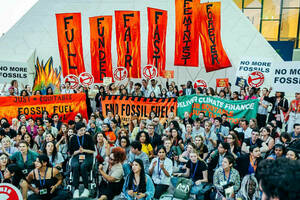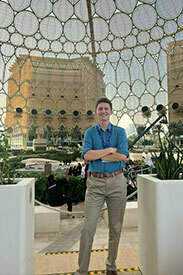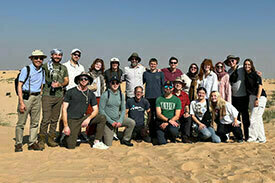 Protesters gather in one of the main streets of the venue, pushing for more comprehensive change
Protesters gather in one of the main streets of the venue, pushing for more comprehensive change
Two Notre Dame undergraduate students, Garrett Pacholl (history and global affairs, peace studies concentration, class of 2024, and 2024 Student Peace Conference co-chair) and Linnea Barron (biology and peace studies, class of 2026), returned from a transformative experience at the 2023 UN Climate Change Conference, COP28 (Conference of the Parties), emboldened and excited to take on environmental justice issues. The event, held in Dubai at the end of the fall semester, from Nov. 30 to Dec. 12, 2023, attracted thousands of delegates, activists, and observers from around the globe to discuss climate policy and negotiations.

of the Central Dome at
Expo City in Dubai
Both Pacholl and Barron were selected by Christian Climate Observers, a program that encourages student applicants to the conference, in addition to emerging climate change leaders from underrepresented communities. Funding for their attendance came from multiple sources, including the Liu Institute for Asia and Asian Studies and the Nanovic Institute for European Studies at the Keough School of Global Affairs, and the Glynn Family Honors Program, based on their proposals, which creatively aligned their research interests with the conference's diplomatic and environmental focus.

the Central Dome of Expo City in Dubai
Their experience at COP28 was eye-opening, as they navigated through a flurry of events, pavilions, and meetings with activists and policymakers from diverse backgrounds. Pacholl and Barron, who attended separate sessions during the two-week event, were particularly struck by the enormity of the conference. “It felt a bit like climate change Disneyland,” said Barron, comparing the size of the cosmopolitan venue and number of attendees – 84,000. “There has been a meteoric rise in attendance,” added Pacholl, who shared that, worldwide, the conference has seen a bump of more than 35,000 attendees since 2022.

Garrett (sixth from right), and
Elsa Barron (Class of 2021, fourth from right)
with the CCOP Cohort
While the experience of attending the major conference was overwhelming because of its sheer size, “The opportunity to meet people from other countries who care about the same things as you is a unique experience – it’s personal and special,” Barron said. For Barron, attending the conference complemented the in-class simulation of COP run by Maira Hayat, assistant professor of environment and peace studies, in her Introduction to Peace Studies class. “Now that I am conducting research with Professor Hayat, I can see the connections between the environment and the concepts we use in peace studies. The conference really enriched this connection for me.” She added, “I was also able to use my experience at the conference to inform a research project in the course, Structural and Cultural Violence, taught by Professor Jason Springs.”
“I had two roommates,” said Pacholl. “One was from Rwanda and the other from India,” he continued, highlighting the conference’s diversity. “Out getting coffee, for example,” he said, “you may see an indigenous woman from Brazil talking to someone from the Philippines, and they are sharing experiences.”

graphics that showcases the
intersection of art and climate activism
Pacholl is a senior whose research interests focus on the climate experiences of those in island states like the Philippines. "I'm interested in climate migration and how people's connections to the land influence their perceptions of climate change, and I found it valuable to hear from speakers addressing these issues and connecting what they shared to my research,” he said. “This was the first time I was really able to engage with leaders, activists and others from small island states such as Samoa and Vanuatu, learning about the incredible steps they are taking on the frontlines of the climate crisis.” He highlighted how Vanuatu, for example, is leading an international coalition to push for an International Court of Justice advisory opinion to clarify states’ legal obligations toward climate change.
Pacholl was able to directly tie his peace studies curriculum to the conference’s theme and goals. “Peace studies has helped me think critically about the voices that are heard regarding climate and its place in international diplomacy,” he said. “It has introduced me to frameworks such as structural violence and slow violence that helped contextualize the negotiations that took place at COP. Hearing directly from local communities impacted by these injustices allowed me to more fully understand the calls for equitable climate justice.”
A sophomore with interests in environmental peacebuilding and neurobiology, Barron found inspiration in the intersection of climate change and peace, highlighting the need for a focus on climate migration and the voices of indigenous communities. She described a poignant moment at a protest during the conference, where various groups came together to advocate for a common goal. “The day of action centered around climate justice and also called for a ceasefire in Gaza,” she said. “It featured prominent, indigenous activists who were pushing for the end to settler colonialism. Then, behind me was another group that was advocating for an end to the armed conflict and polluted wetlands created by oil production in West Africa.”

Linnea Barron march in a
peaceful protest at COP28
As they returned to campus, Pacholl and Barron brought back not only a wealth of knowledge and inspiration but also a renewed sense of purpose in the fight against climate change.
“Looking at this experience through a peace lens, it is essential to understand how our human interactions with the natural world impact it, and how the natural world impacts us. It is important to find a balance and harmony through these interactions,” said Barron.
Their journey from Notre Dame to COP28 serves as a testament to the Keough School's commitment to nurturing global citizens and change-makers.